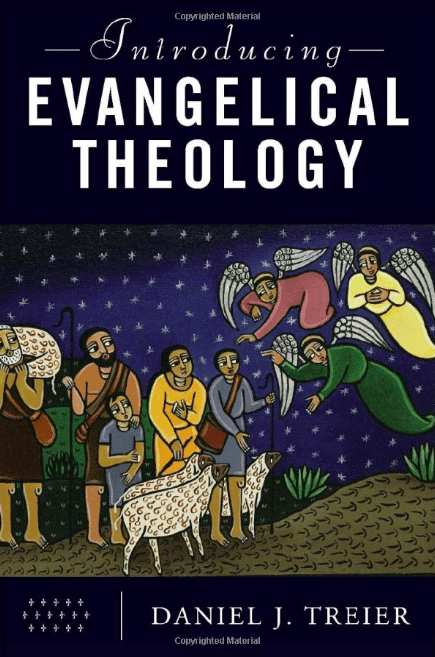 It’s a debate not likely to lead to an overwhelming consensus, but Daniel J. Treier’s Introducing Evangelical Theology builds on a credal approach. What is added to the lines, between the lines, before the lines, after the lines… all matters for an evangelical theology.
It’s a debate not likely to lead to an overwhelming consensus, but Daniel J. Treier’s Introducing Evangelical Theology builds on a credal approach. What is added to the lines, between the lines, before the lines, after the lines… all matters for an evangelical theology.
In a kind of Barth-like move he opens with nothing less than 15 theses for this evangelical theology and here they are:
- Christian theology is a communicative practice of faith seeking understanding, in response to the Word of the Triune God accompanied by the Holy Spirit.
- Christian beliefs are integrated with behavior, extending Israel’s moral tradition from the Ten Commandments to root human community in the love of God and neighbor.
- Christian beliefs are integrated with belonging as well as behavior, reforming Israel’s spiritual tradition to inaugurate a community of grace among Jesus’s followers, as epitomized in the Sermon on the Mount and especially the Lord’s Prayer. [This one needs Holy Spirit and church as terms present in the thesis.]
- Christian orthodoxy teaches that the one true God is triune, existing in three persons—Father, Son, and Holy Spirit—who are undivided in the external works that reveal the divine identity.
- From creation to consummation, providence reveals the Triune God’s perfections of power, wisdom, love, and holiness; the drama of redemption is the setting in which the Bible addresses the mystery of divine sovereignty and human responsibility along with the meaning of evil.
- Creation out of nothing is an article of Christian faith according to which the Triune God has spoken the world into existence—granting dignified life, dependent freedom, and delightful fellowship to creatures in their materiality, sociality, and temporality.
- Human beings are uniquely created to commune with God and to communicate what God is like; for this calling God has made them embodied souls and relational selves, with each person and culture having dignity rooted in God’s love and their diversity being an occasion of divine delight.
- The orthodox identity of Jesus Christ involves the hypostatic union: in the incarnation the fully divine Son of God has assumed a fully human nature, to serve as the one Mediator of revelation and redemption.
- Jesus Christ’s ministry of reconciliation as the Mediator between God and humanity is signaled by his virginal conception; continues throughout his earthly ministry as messianic prophet, priest, and king; climaxes in his atoning passion; and commences a newly exalted phase in his resurrection and ascension.
- All of Adam and Eve’s descendants are born dead in sin, which is rooted in idolatry and inevitably results in injustice. The Spirit’s application of Jesus’s reconciling work brings salvation from sin’s past, present, and future effects; justification removes sin’s penalty, regeneration removes sin’s power, and glorification removes sin’s presence from those who are united with Christ.
- The gospel takes cultural form in Orthodox Christianity, emphasizing a tradition of theosis; in Catholic Christianity, emphasizing the sacramental renewal of creaturely being; and in seven major traditions of Protestant Christianity, emphasizing the gospel’s freedom for biblical reform.
- The Holy Spirit is the divine Giver of creaturely life, pouring out common grace, and the divine Giver of new life, applying Christ’s redeeming grace as God’s empowering presence—fostering conversion, consecration, assurance and perseverance, and shared ministry.
- The authority of Holy Scripture emerges from God’s final Word having been spoken in Jesus Christ; by the Holy Spirit, the written words and message of the prophets and apostles faithfully proclaim divine truth and powerfully rule over the church—even, with appropriate nuance, through various translations and the process of interpretation.
- The Bible identifies the church as God’s people in Christ; the Spirit graciously uses various practices for shaping the church as a community of worship, nurture, and witness; along with Word and “sacrament, institutional order marks the church, yet traditional models of polity require wise modern implementation and humble acknowledgment of communal brokenness.
- The vital Christian hope that God will make all things new has both cosmic and personal dimensions: cosmically, involving the return and reign of Christ as anticipated in biblical prophecy; personally, involving resurrection of the body and final judgment. This hope is already inaugurated but not yet completely fulfilled, thus serving as an impetus for mission and an incentive for martyrdom in whatever form becomes necessary.











